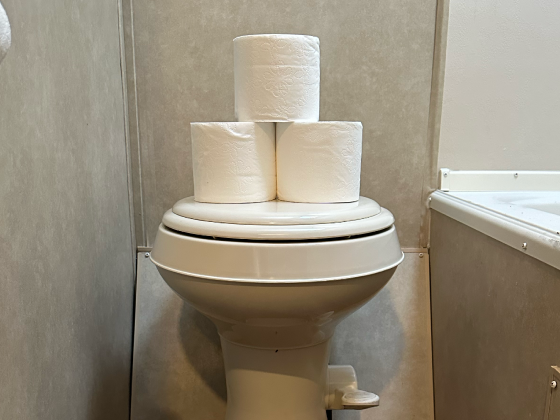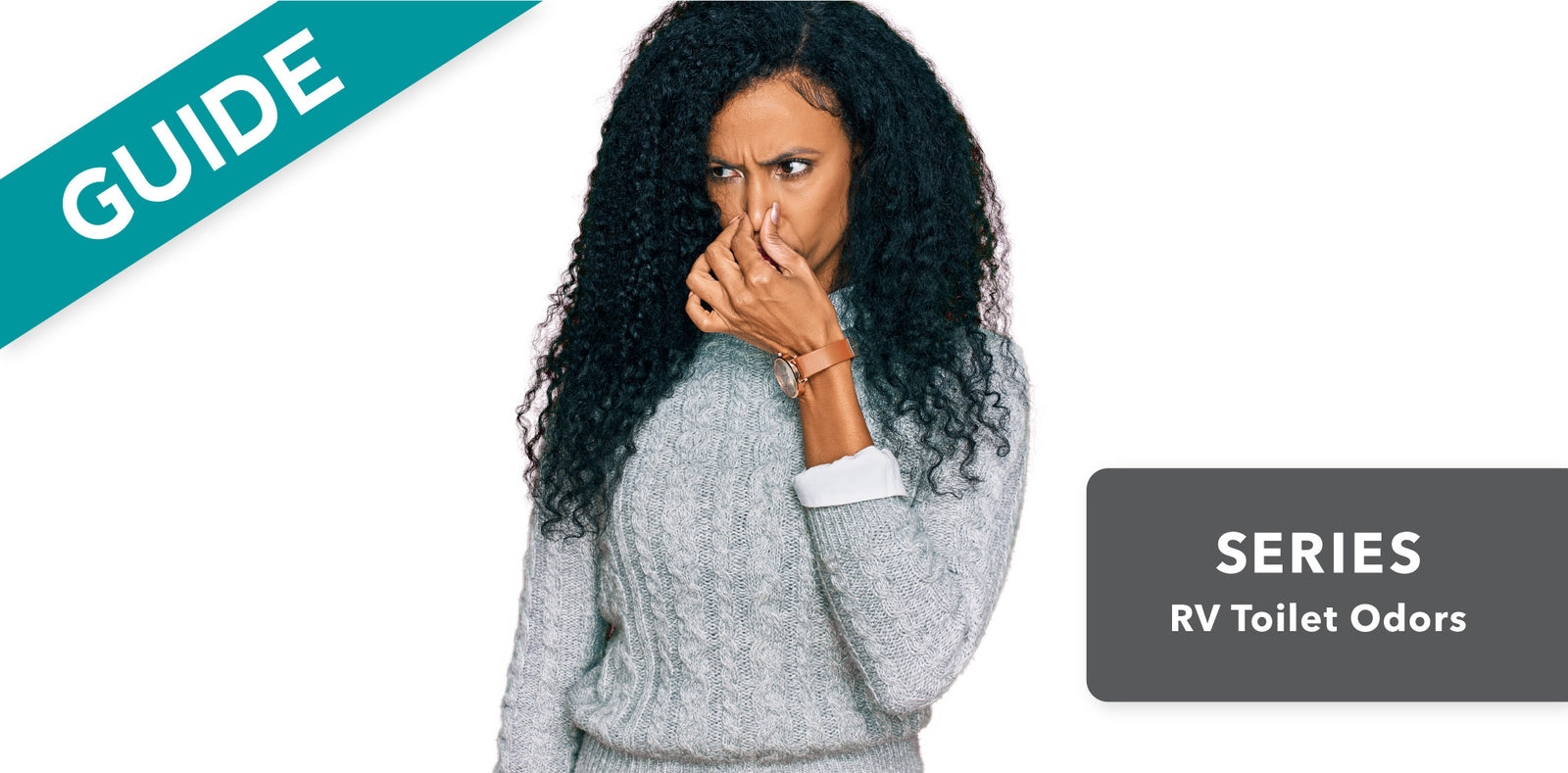Article 2 of 4 in Series: RV Toilet Odors
Read series from the beginning
Key Points:
- Bacteria from our gut release bad smells as they break down waste, which is what causes odors in your tanks.
- Odors from bacteria can increase and persist because of too little water in your tanks, high temperatures, bacteria-killing tank treatments or cleaning products, or improper ventilation.
- Consistently using The Unique Method will take care of many of these issues.
Why does my camper smell like sewage? What a loaded question. You might be surprised at all the possible answers to that problem. Who knew keeping your RV odor-free could be so nuanced! It could be habits you’re not employing, the treatment products you’re using/not using, maintenance checks you’re neglecting, or a combination of all of them! In this article, we will touch on some of the reasons you could be dealing with sewer smells in your RV.
What Causes Odors?
Bacteria. It’s that simple. Anaerobic (bad) bacteria that exist in your gut come out on the solid waste when you use the toilet. Just because they are outside of the body doesn’t mean they stop breaking down waste. They continue doing it while in the holding tank, but part of that process causes them to expel hydrogen sulfide (methane) gas, which is what causes the odor. But not all bacteria are bad. Aerobic (good) bacteria are a different type that break down waste but do not give off odors. In fact, they will begin to push out the bad bacteria, neutralizing the smells they emit. The good bacteria is found in nature and is harnessed in high-quality bacteria and enzyme tank treatments (like Unique RV Digest-It Plus), which is the type of tank treatment we recommend using most often. But just adding a treatment like this and calling it good is not enough. When you add bacteria to your tank, there are several habits you’ll want to master to make sure they are able to function as effectively as possible.
Also keep in mind that black tank wastewater is not the only thing that can cause odors. Gray tanks contain grease, oils, soap scum, and human hair and skin particles, all of which contain bacteria of some kind. This mixture can cause smells as bad as or worse than black tank smells, so make sure you are treating your gray tank with RV Digest-It Plus as well.
Use Lots of Water
Water is the nemesis of RV tank odors, and when you don’t have enough of it in your tanks, odors are free to roam wherever there is space to seep through to the living area. As we explained above, odors develop because smelly bacteria from your gut has been added to the black tank along with the solid waste. Water is a great way to mitigate the smell because it acts as an airtight barrier to stop smells from rising. As long as there’s enough water in the tank to cover the solid waste completely, smells will be severely reduced. Even having standing water in your toilet bowl can add another layer of odor protection. We invite you to read more in our guide on Why Using Lots of Water in your RV Toilet and Tanks is Crucial.
In addition to being an odor blocker, water allows the good bacteria to reach all the solid waste so they can break it down and push out the smelly bacteria. Water is literally the roadway on which bacteria travel to the waste, so if part of the solid waste is exposed above the waterline, that portion will still give off smells and will not be broken down by the odorless bacteria.
Keep Tank Temperatures Moderate
When your body gets overheated, what happens? You’re moving a little slower, you get tired faster, and you generally don’t perform tasks very efficiently because your body is taxed by heat. Aerobic (good) bacteria are affected by heat the same way. When their environment is too hot, they don’t break down the waste quickly or effectively. They slow down. It’s especially important to use lots of water on every flush when camping in high heat; heat causes any liquid that’s in the tank to evaporate faster, which could expose solid waste faster, so using as much water as possible on every flush will allow you to stay ahead of evaporation. Adding water also cools the tank to help those odorless bacteria gain the energy they need and do their job well. The bacteria in the gray tank can be severely affected by heat too, so make sure you’re treating your gray tank with Unique RV Digest-It Plus (when your valve is closed).
Cold temperatures can also negatively affect the performance of the bacteria, so if you’re camping in very cold weather, we recommend installing some kind of heating element on your tanks to avoid sluggish bacteria.
Guide: How to Control RV Holding Tank Smells in High Heat
Guide: How to Keep Your RV Holding Tanks from Freezing
Avoid Bad Treatment/Cleaning Products
We just got done explaining how using a bacteria and enzyme tank treatment is the best option and that bacteria need lots of water and moderate temperatures. So what if you do all these things but decide to clean your toilet bowl with bleach or a bacteria-killing cleaning product? You guessed it; it gets flushed right into the black tank and kills the bacteria, counteracting the breakdown activity. Bacteria-killing cleaners, antibacterial hand soaps, and antibacterial dish soaps can all devastate the waste breakdown happening in your holding tanks, so we always recommend using cleaning products (like Scrub-It RV toilet cleaner) that will enhance the strength of the bacteria, not harm it. We also recommend using Dawn Ultra dish soap for dish washing and hand washing because aside from not harming the bacteria in the tank, it’s a great grease-fighting soap that will diminish the risk of sensor misreading's and stinky smells in your gray tank. We walk through in detail the different treatment products out there and the best ways to treat your tanks in our guide on Eliminating RV Toilet Odors.
Guide: Why You Should Use a High-Quality Waste Digester in Your RV
Guide: How to Clean Your RV Toilet Bowl
Ensure Proper Ventilation
Ventilation in your RV is way more important than you might think in keeping nasty smells from making a home in your living space. You should be regularly checking for leaks and weathered seals that could provide a pathway for odors. Vents can be a problem too; they could have been installed incorrectly or they could be clogged with organic debris like animal nests or even dead animals. You might even be parking your RV incorrectly! If the wind is blowing against the vent side of your RV, it could be pushing odors back inside or could be causing so much downward pressure on the roof vents that odors can’t escape. How you use your tanks on sewer hook-up is also a potential culprit. We address all these ventilation issues in our guide on Eliminating RV Toilet Odors.
Review
All of these reasons for sewage smells can be easily avoided by just following The Unique Method on a regular basis, but for now, here’s a brief review of what we covered in this article:
- Bacteria that come from your gut are the cause of sewage smells in your RV black tank.
- The best way to fight the stinky bacteria is to add bacteria that breaks down waste but doesn’t cause odors.
- Here are some reasons odors could be a problem in your RV:
- Not enough water in your toilet and tanks
- Holding tanks are getting too hot
- Cleaning products are killing the bacteria in your tanks
- Ventilation system is not venting odors properly
Now that you know why that sewer smell is wafting through your serene camping trip, let’s discuss in the next article a few things you may need to check or habits you need to change to fix it.
As an Amazon Associate, Unique Camping + Marine earns from qualifying purchases

Prevent Common Problems In Your Tanks!
From misreading sensors, preventing clogs, or eliminating odors, we've got you covered no matter how you camp! All our best holding tank tips and trick information plus more can be found conveniently in one place when you download our FREE Unique Method Field Guide. Achieve holding tank bliss today!
Get The Free Download



